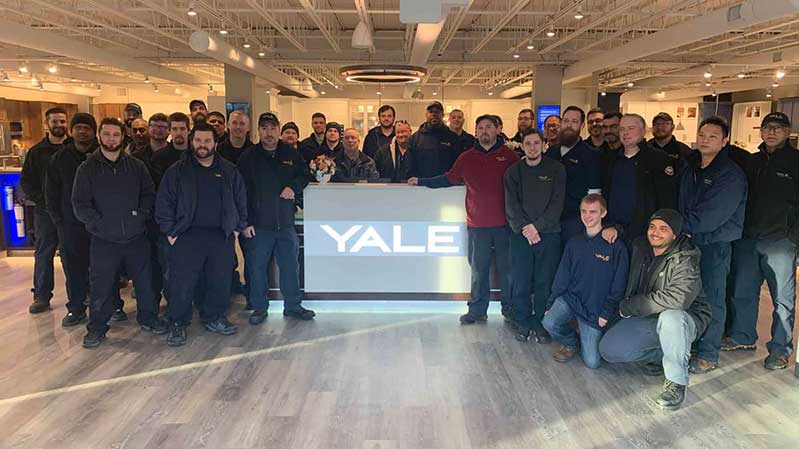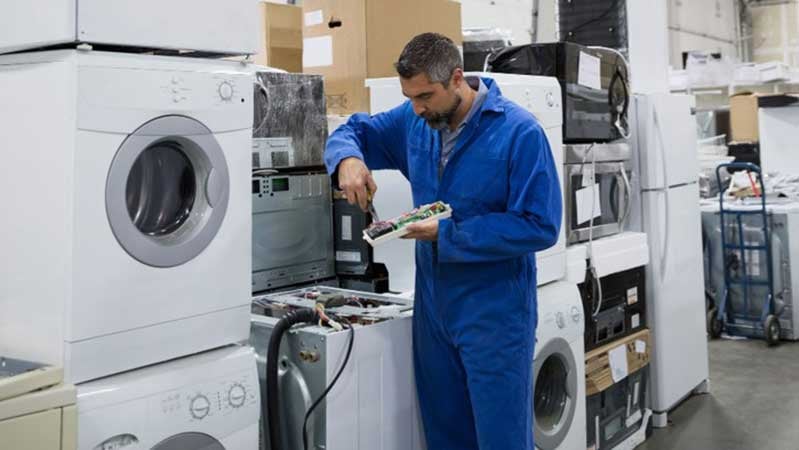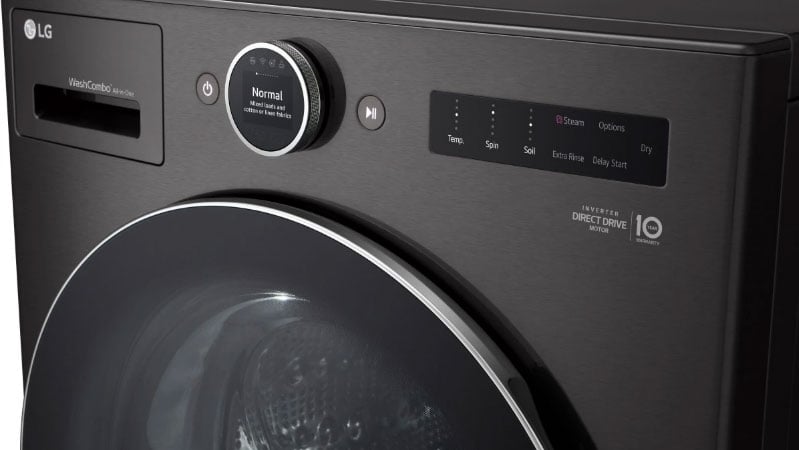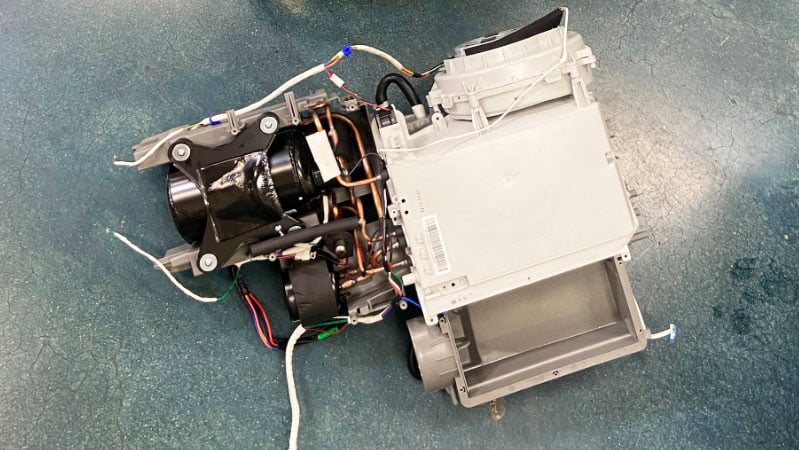Why Your New Appliance Will Not Be Repaired in 2025
October 17th, 2024 | 8 min. read

Today seems like any other day. Then you wake up, and your refrigerator is warm.
The mad scramble begins.
You try to find a service agent—thinking it’ll be as quick as ordering groceries online and seeing the Amazon van pull up in an hour.
But after calling multiple service agencies and being placed on hold for hours, you get that sinking feeling: your refrigerator won't be fixed anytime soon.
By late 2024, supply chain issues are mostly a thing of the past—unless the ports strike in 2025.
Then again, you may face even more challenges fixing your appliances going forward.
In this article, you'll learn about the problems, pitfalls, and how to protect yourself.
That is... if you still can.
Why Your New Appliance Will Not Be Repaired in 2025
The Sad State of Appliance Repair

We’ve been publishing content on this blog since 2007, and on our YouTube channel since 2017.
Below are comments from our blog. None of these viewers purchased from Yale.
Comment One: Samsung Refrigerator Repair
"Steve, You start out stating that Samsung is the most reliable refrigerator This is blatantly false. It is in fact one of the WORST if not THE WORST. You don't pay attention to your own messages. And it is not just the ice maker. Yes, my ice maker quit exactly 3 days after the one year warranty expired. I refused to get it fixed: the estimate was about $400.00. Any ice maker that Samsung makes is worthless & will fail again in short order. Now after 5 years the water dispenser went bad, estimate to fix is about $350. I will be getting that fixed. My sister has a French door Samsung and the entire back of the refrigerator frosted up."
Comment Two: LG French Door Refrigerator Repair
"I currently have a french door LG and it is a nightmare. Did my research, but bought it before anyone knew about the drain issue LG has and won't take care of. We literally get a sheet of ice in the bottom of our freezer about an inch and a half thick. We have to chisel it out. We tried taking the back of the frig off and cleaning the house etc. but that did not work. End result, we shut the water off. So we paid big bucks for a frig with a water/ice dispenser that we can't use because of poor design/engineering. What I want to know do other French door frigs with water/ice dispensers have the same problem from other manufacturers?"
Comment Three: Whirlpool Refrigerator Repair
"Hi Steve, I often revisit your site, to see what the most reliable brands are in various appliances. We’re a Whirlpool and WP brands family. Our microwave was recently replaced and we felt forced to stick with GE based on the fact we wanted it to fit properly into our cabinet, especially buying online. However, we purchased a Whirlpool French door refrigerator four and a half years ago. Unfortunately, the ice maker stopped producing ice and after a few service calls, it’s been decided we have a slow coolant leak in the line somewhere. The estimated repair cost of $700-$800 was not worth fixing and our refrigerator is still cooling and freezing quite well, just not enough to produce ice."
It's funny, but I’ll often get both glowing and scathing comments about the same product—on the same day.
I’ve been accused of being “paid off” by critics almost daily, even though I would never accept payment from any brand.
At Yale, we do favor certain brands, but only based on what’s the most reliable at the time.
While other companies boast about selling 150 brands, we focus on selling around 30 brands.
We can only service reliable brands.
That’s your first step in protecting yourself: buy only reliable brands.
Note: We’ll be releasing our appliance reliability rankings soon. Click here to subscribe and be the first to know the most reliable brands—and protect yourself from the less reliable ones.
Service Repair In the Age of Post-COVID-19
The most stressful job in this company is service management. I held that role when we started service in 1994.
It’s tough talking to unhappy people all day.
Back then, it was just five of us.
Now, we have over 100 people in parts, management, fleet, and inventory, supporting 40+ service technicians from New Hampshire to Nantucket.

In 2020, we had "the list."
This list was for unavailable parts. Let’s say your refrigerator wasn’t working—we could either get the parts to fix it or provide a new unit to replace it.
We loaned whatever we could at the time so at least you could keep your food cold.
Since then, the supply chain has mostly stabilized.
But it has stabilized in different ways.
With some new parts suppliers, there is more repair availability, but challenges still exist.
Technology Changes in Appliances
Appliances are becoming more advanced.
For example, dryers are transitioning from vented to heat pump models.

This means repairs are changing from fixing simple elements to diagnosing whether the issue is with the compressor, heat exchanger, or evaporator.

Conceivably, you might need a refrigerator technician to fix your dryer.
Appliances are now smart, allowing you to control them through an app on your phone.

Soon, they’ll have AI algorithms to cook for you with precision and cameras so you can watch your food cook from your phone.
But who will fix all that new technology?
(If you're already feeling overwhelmed, you can skip ahead to the section on how to protect yourself.)
It gets worse, and here’s why:
Facing Appliance Repair Challenges in 2025: What You Need to Know
Servicers must also pay for workers' compensation, auto insurance, and liability insurance against damage just to enter your home.
On top of that, manufacturers typically only pay $95 per repair—whether it’s fixed on the first visit or the sixth, even for a manufacturing defect.
As a result, many retailers have exited the service business altogether.
Manufacturers, too, have reduced their service offerings, if they have any at all.
At Yale, service is a huge part of our business.

The graphic above illustrates a typical day at Yale, where we manage over 120 in-home appliance service stops each day.
Service is a huge part of any appliance store, whether they handle it with their own technicians or have operators finding service agents for you.
The Decline of Appliance Service Technicians
I went to Needham High School. Back then, they had an auto shop and other tech classes.
But over the past 40 years, technical schools of all kinds have been minimized or shut down entirely.
Massachusetts has no school for appliance repair. It’s a dying profession, yet one in desperate need—like all the trades.
Think about it: You call a plumber and thank them for trying to fit you in. Now try it with an electrician.
Yet, people aren’t entering this field to become service techs, despite the overwhelming demand.
Then again, would you, with compensation levels being so low?
In 2003, the average age of a service technician was 53 years old.
I wonder what the current average age is and how many technicians are employed compared to 2003.
Appliance Extended Warranties
Extended warranties are incredibly smart right now.
Like many people, I didn’t believe in extended warranties for most of my career because appliances usually lasted beyond the warranty period.
But now, they’re a decent hedge—especially with appliances like refrigerators, washers, and induction ranges breaking down more often.
Yale Google Review:
Great service. I had an extended warranty on an Electrolux washer. The part that needed replacing was no longer available, so they gave me a new machine with a brand new warranty. It’s actually cheaper for us to give you a new machine than spend six hours repairing your old one.
How Appliance Warranties Work and What They Don’t Tell You
Not all extended warranties are the same. Most are outsourced to call centers.
These companies don’t employ a single technician and instead rely on small independent businesses to fix appliances.
These independent businesses will decide if they can make money on your repair based on their low contract rate.
For complicated repairs, like a refrigerator compressor or a washer tub, they may not even attempt the job in most cases.
A servicer won’t spend six hours fixing a machine for $75–100. It’s just not economically feasible.
So, do your research and exercise due diligence before purchasing an extended warranty.
It’s crucial to understand who is actually providing the warranty coverage.
It’s always a good idea to consider stores with their own service departments when buying appliances—but don’t forget to check the reviews as well.
Later in this article, I’ll show you how to effectively check those reviews.
Manufacturers’ Extended Warranties
You can buy appliances with full warranties that last up to seven years and part warranties that last as long as twenty years.
However, you need to be cautious with these as well.
It’s highly unlikely that a service agent will repair the machine in year six of a full warranty or year sixteen of a limited one at a low warranty rate.
It's better to buy the product based on its merits rather than relying on the warranty.
Note: I only hear horror stories. If you’ve had any experiences with warranties—good or bad—please share them in the comments.
Now, let’s see how we can avoid these issues.
Read More: Are Appliance Extended Warranties Worth It?
How to Avoid This Problem: Check Reviews

First, service has to be part of your buying process.
Features are fun, of course, but service, delivery, and installation are far more important in the long run.
You should be well-informed before purchasing any appliance.
In fact, when comparing similar products, service should be the deciding factor.
You may be trusting, but I recommend using the vast resources at your disposal.
Google reviews are generally fair because they don’t filter anything.
Stores with a 4.6 rating or higher are typically reliable, but make sure to specifically look for reviews about appliance service.
Yelp, on the other hand, is the most unfair source due to its opaque filtering system.
With Yelp, check the filtered reviews as well. They often prioritize negative reviews initially, based on star rating rather than date, which is more relevant.
Make sure to balance the negative reviews with the good ones at the end.
The Better Business Bureau (BBB) gives everyone an A+ if they pay, but check the complaints section for real issues.
Some companies with 350 negative cases still maintain an A+ rating on the BBB.
The best way to avoid problems is to be prepared before you buy your appliances.
Remember, no company is perfect, so read how they respond to complaints and how issues are resolved.
If you’re buying six appliances for your new kitchen, you’ll likely need service for at least one of them within a year.
What to Do with an Unrepaired Appliance
What you do depends on how old the appliance is.
If there are mitigating issues, like delivery damage, you should receive a replacement immediately.

Note: NEVER sign a delivery form without first checking both your appliance and property for damage.
For system failures, such as a refrigerator that’s not cooling, it should be replaced after just one service call.
After a year, it gets tricky because the warranty has likely expired.
At this point, it’s important to remember who you purchased the appliance from and leverage that relationship.
Most people will call the manufacturer, but they likely won’t help. In their mind, they didn’t sell the appliance to you directly (crazy, I know).
You need to reach out to the retailer and expect them to do what’s reasonable.
It’s usually easy to find the owner or manager online.
Social media can also get a company’s attention, but make sure your complaint is legitimate.
A Word About Self-Servicing Appliance Dealers

You might think that buying from a self-servicing dealer is a good idea because they have more control.
Unfortunately, many self-servicing dealers don’t have the resources to provide adequate service.
In the Massachusetts market, there are several good service dealers, like Poirier, George Washington Toma TV and Appliance, Hunter Appliance, and Doyon's.
All of them provide decent service in the Boston area.
Most self-servicing dealers, like us, will only fix appliances bought from their store due to overwhelming demand.
Why Do We Invest in Service?
(This section is for appliance dealers. Yes, I know you’re reading.)
We invest in service for two reasons:
First, most of our significant builders have told me they only use us because of our service. They want their clients satisfied and not calling them with issues.
The second reason is that there’s no better marketing for Yale—or your business (if run correctly).
Our ad budget is almost zero—less than 0.01% of sales.
Instead, we fund service with the marketing dollars we save.
You must look at service as marketing, not as a profit generator.
Service will never generate profit, but it can provide a significant competitive advantage.
Good service is far more compelling than any ad. It’s just much harder to execute from a resource and staffing standpoint.
And, like you, I also really hate being yelled at.
It’s much easier to fix the problem than to keep explaining why you can’t.
Read More: 6 Odd Yet Effective Tips to Choose an Appliance Store
Key Takeaways
The key to avoiding an unrepaired appliance is preparation.
You need to factor in service as part of the overall purchase, because you have all the leverage before the sale and almost none afterward.
Before you buy, find out who handles the service and extended warranty.
Anything "promised" should be put in writing on the sales slip.
Call me skeptical but having it in writing is much better than relying on a verbal promise after the fact.
Preparation is far easier than dealing with a rapidly thawing refrigerator a year later—with no help in sight.
Additional Resources
Have questions on appliances? Read the Yale Appliance Buying Guide with the 10 most frequently asked questions, the best time to buy appliances as well as detailed profiles of all the brands. Well over 1 million people have read a Yale Guide.
Related Articles:
Why Should You Trust Us?
It seems that every appliance review has nothing but glowing comments about almost every product, yet you read customer reviews and they are almost universally bad.
We are here to fill in the disconnect. We'll give you the best features, and the drawbacks as well, including reliability based on over 37,000 calls performed by our service team just last year. Our goal is to give you ALL the information so you know what's right for you.
Please consider subscribing or adding to the conversation in the comments below. We appreciate you stopping by.
Steve Sheinkopf is the third-generation CEO of Yale Appliance and a lifelong Bostonian. He has over 38 years of experience in the appliance industry, and he is a trusted source of information for consumers on how to buy and repair appliances.
Steve has also been featured in numerous publications, including the
New York Times,
Consumer Reports,
The Boston Globe,
Bloomberg Radio, the
New York Post,
The Wall Street Journal, and
Entrepreneur, for his knowledge of how to buy appliances and appliance repair.
Steve is passionate about helping consumers find the best appliances for their needs, and he is always happy to answer questions and provide advice. He is a valuable resource for consumers who are looking for information on appliance buying, repair, and maintenance.
Despite being the worst goalie in history, Steve is a fan of the Bruins and college hockey, loves to read, and is a Peloton biker. The love of his life is his daughter, Sophie.
A Note About Pricing
Pricing on this blog is for reference only and may include time sensitive rebates. We make every attempt to provide accurate pricing at time of publishing. Please call the stores for most accurate price.

